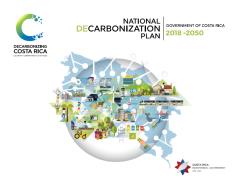The Government of Costa Rica has become the 14th country to submit its long-term strategy for low-emission development (LTS) to the UNFCCC Secretariat. The LTS conveys Costa Rica’s aspiration to be a modern, green and emissions-free economy, and commits the country to net-zero emissions by 2050. Costa Rica’s ‘National Decarbonization Plan 2018-2050’ lays out the process for achieving these objectives, and explains that while the country has natural capital, education and openness, its transition to net-zero emissions could be slowed by shortcomings in infrastructure, including in the transport sector, and fiscal constraints.
Involving every sector of the economy, the LTS is structured along ten decarbonization axes derived from the country’s greenhouse gas (GHG) emissions patterns, and correspond with the major emission sources. These axes relate to:
- developing a mobility system based on safe, efficient and renewable public transport, and on active mobility schemes;
- transforming light-duty vehicles to zero emissions;
- promoting cargo transport that adopts modalities, technologies and sources of zero or lowest possible emissions;
- consolidating the national electric system with capacity, flexibility, intelligence and resilience to supply and manage cost-competitive renewable energy;
- developing buildings for different uses under high-efficiency standards and low emission processes;
- transforming the industrial sector through processes and technologies that use energy from renewable sources or low or zero-emissions methods;
- developing an integrated waste management system based on the separation, reuse, revaluation and disposal with maximum efficiency and low emissions;
- promoting efficient agro-food systems that generate low carbon, local consumption and export goods;
- consolidating a livestock model based on productive efficiency and emission reductions; and
- consolidating a land management model that facilitates biodiversity protection, forest cover increases and maintenance, and ecosystem services based on nature-based solutions.

